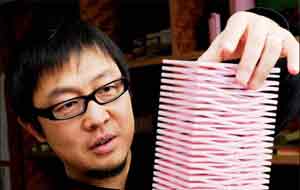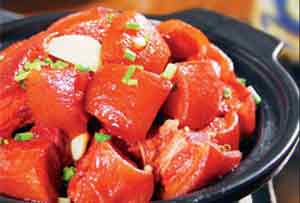Pot maker: National standard to blame for test failure
Updated: 2011-10-20 13:12
By Zhou Wenting (China Daily)
|
|||||||||
BEIJING - Supor, a Chinese home-appliance producer, says that the national standards guiding the production of steel pots are backward and are the reason why 81 types of its pots were found faulty by a market watchdog in Harbin, Heilongjiang province.
In response to the finding, retailers throughout the country have pulled the products from their shelves.
"We also wonder why our products were found to be qualified under a strict standard but now are failing to pass muster under a looser standard," Zhang Liping, spokeswoman for Zhejiang Supor, said on Wednesday.
"We have objected to the ruling and have submitted an application asking for another inspection."
This month, Harbin's Daowai district branch of administration for industry and commerce said 81 types of the company's stainless steel pots contained excessive amounts of the heavy metal manganese and not enough chromium and nickel. More than 1,000 of the brand's pots have since been inspected and confiscated.
Experts said stainless steel is an alloy made of chromium, which does not corrode easily; nickel, which is also resistant to corrosion and high temperatures; and iron.
"Pots that contain little of the two metals will not be effective and will not last long," said Dong Jinshi, executive vice-president of the International Food Packaging Association, which is based in Beijing.
"Moreover, an excessive amount of manganese might harm human health. Although the national standard established in 1988 did not set a limit on manganese content, the industry standard issued in 1992 has specific limits."
Speaking for Supor, Zhang said the market watchdog's ruling was made in accordance with a national standard issued in 1988. She said Supor has had its products tested, but that it did so in accordance with a different standard, one that was set in 1992.
Several experts said industrial standards are stricter in general than national ones, but that the two may have different aims. "The former emphasizes safety and health and the latter attaches more importance to practical performance," said Dong.
"When the two conflict, we usually stick to the national standard," said Qiu Baochang, head of the China Consumers Association's lawyer group.
Both Qiu and Dong said the national standard should be refined and brought up to date. They said a standard that was adopted 23 years ago may have been made obsolete by more recent changes in manufacturing technology.
Supor has also asked the government to take an authoritative stance on what material standards should apply to pots.
"The industrial standard in 1992 allowed the use of other materials, and the content of metal elements in every type (of pot) is different," Zhang said.
"These materials are widely used in export products, and have never been questioned."
Several retailers said they will temporarily cease to sell the pots.
"All the reported substandard cooking utensils have been removed from the shelves in all of our outlets as well as from our shopping websites," said a marketing manager with Suning Appliance, who only gave her surname, Yuan.
"Consumers who previously bought these types of pots from us can go to our stores to exchange them for another product or to obtain a refund."
Gome, another retailer of home appliances, made a similar statement.









